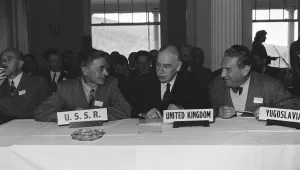International Security is America's leading peer-reviewed journal of security affairs.
Summary
The emerging transition from unipolarity to a more multipolar distribution of global power presents a unique and unappreciated problem that largely explains why, contrary to the expectations of balance of power theory, a counterbalancing reaction to U.S. primacy has not yet taken place. The problem is that, under unipolarity and only unipolarity, balancing is a revisionist, not a status quo, behavior: its purpose is to replace the existing unbalanced unipolar structure with a balance of power system. Thus, any state that seeks to restore a global balance of power will be labeled a revisionist aggressor. To overcome this ideational hurdle to balancing behavior, a rising power must delegitimize the unipole’s global authority and order through discursive and cost-imposing practices of resistance that pave the way for the next phase of full-fledged balancing and global contestation. The type of international order that emerges on the other side of the transition out of unipolarity depends on whether the emerging powers assume the role of supporters, spoilers, or shirkers. As the most viable peer competitor to U.S. power, China will play an especially important role in determining the future shape of international politics. At this relatively early stage in its development, however, China does not yet have a fixed blueprint for a new world order. Instead, competing Chinese visions of order map on to various delegitimation strategies and scenarios about how the transition from unipolarity to a restored global balance of power will develop.
Randall L. Schweller and Xiaoyu Pu, "After Unipolarity: China's Visions of International Order in an Era of U.S. Decline," International Security, Vol. 36, No. 1 (Summer 2011), pp. 41-72
The full text of this publication is available in the link below.





